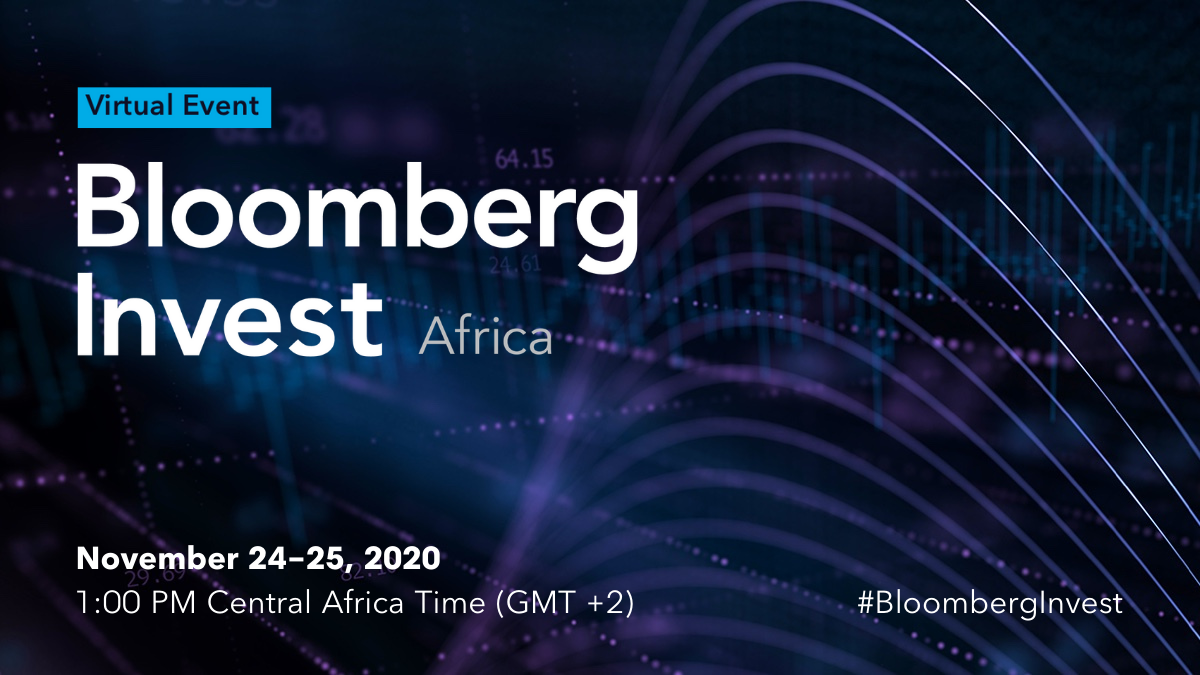
Event Highlights
Bloomberg Invest Africa
By Yazhou Sun, Bloomberg Live
Covid-19 and its subsequent lockdowns have sparked Sub-Saharan Africa’s first recession in 25 years. The regional economy is forecast to shrink by 5.1% in 2020 and GDP losses potentially hitting $236 billion.
But while Africa is down, it’s definitely not out. The factors that made Africa an attractive investment destination pre-Covid are still there: a talented youthful population; a three-trillion-dollar continental free trade deal; low-cost manufacturing opportunities; and an improving business environment and macroeconomic governance.
To lure foreign investors back in a significant way, regional stakeholders must highlight rock solid economic plans for Covid-19 recoveries. Join us at Bloomberg Invest Africa as we convene regional and global finance and business leaders to chart a way forward to maximize Africa’s post pandemic growth trajectory.
At Bloomberg’s inaugural Invest Africa event, Bloomberg’s editorial team had a series of conversations with key voices and leaders in the region. Speakers included:
- António Henriques da Silva, Chairman, AIPEX
- Dr. Shungu Gwarinda, CEO (interim), Graça Machel Trust
- Hoda Moustafa, Regional Head – Sub-Saharan Africa, MIGA
- James Zhan, Director of Investment and Enterprise, UNCTAD
- Sir Paul Collier, Professor of Economics and Public Policy, Blavatnik School of Government, Oxford University
- Sérgio Pimenta, Vice President for the Middle East and Africa, IFC
- The Lord Dolar Popat, Prime Minister’s Trade Envoy to Rwanda and Uganda, House of Lords, Government of the United Kingdom
- Mallika Kapur, Deputy Global Editor, Bloomberg Live
Below are some highlights from the event.
Click here to access videos of all the sessions.

On the state of FDI in Africa: James Zhan, Director of Investment and Enterprise at UNCTAD painted a gloomy picture for FDI in Africa post pandemic. “We need to look at the investment stock, FTI stock in Africa and that is close to $1 trillion equivalent to close to 40% of the GDP,” Zhan said.

On debt sustainability in Africa: Sérgio Pimenta, Vice President for the Middle East and Africa, IFC says the public and private sector must collaborate to provide sustainable solution to the debt crisis. “On the government side, that means having a more level playing field and encourage stronger competition, Pimenta said. He also stressed the importance of creating jobs for women and young people, an important contribution that the private sector can play.

On transforming Angola: “Angola is not only confronted with the need to diversify its economy, but was also confronted to the need to transform in the sense of enabling a much investor friendly space,” António Henriques da Silva, Chairman, AIPEX said. Da Silva said Angola is reviewing the investment law and investors’ rights in a push to make the country more attractive to investors.

On investment opportunities in Africa: “DRC has got roughly about 60% of minerals in the world. Their mineral wealth is about $25 trillion,” Lord Dolar Popat, UK Prime Minister’s Trade Envoy to Rwanda and Uganda stressed the huge growth potentials in mineral-rich Africa, and the need for political will to invest in the continent.

On tackling corruption in Africa: Sir Paul Collier, Professor of Economics and Public Policy at Oxford University said to tackle corruption in Africa, there needs to be a two-pronged approach– Governments in Africa need to promote transparency and accountability, and the West must act. “Britain really moved very fast from creating proper scrutiny of the beneficial ownership of companies, to tackling shell companies, to tackling the abuses in the overseas territories of the banking secrecy,” Collier said.

On investment challenges in Africa: “We’re seeing the coup in Mali, a conflict in Ethiopia, contested elections in Cote d’Ivoire, FX shortages in Nigeria,” Hoda Moustafa, Regional Head of Sub-Saharan Africa at MIGA said. “It’s important to look at each of those risks and how they can be mitigated and what is the proper allocation of risks as between government and the private sector.

On empowering women: “On the continent, if more investments and more focus on gender equality are prioritized, we could have spurred or added upwards of about $300 billion or 10% with GDP by 2025,” Dr. Shungu Gwarinda, interim CEO of Graça Machel Trust said. Dr. Gwarinda reiterated the importance of creating access to financing and capacity building for female entrepreneurs, which is the engine for growth globally.
Bloomberg Invest Africa is proudly sponsored by

——————————
Join the Conversation: #BloombergInvest
Instagram: @BloombergLive
LinkedIn: Bloomberg Live
Twitter: @BloombergLive
Interested in more Bloomberg Live virtual events? Sign up here to get alerts.
——————————